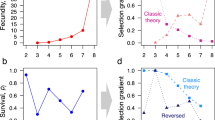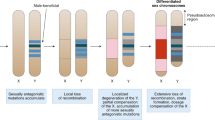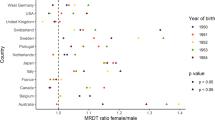Abstract
RECENTLY I have attempted to develop a general theory of ageing applicable to mammals1. This theory assumes that, during the life-time of the animal, whole chromosomes, which are contained in the somatic cells, suffer a total loss of function in a single random event. It further assumes that the probability of such an event remains constant throughout life-time and that it is the same for all individuals of a given species.
This is a preview of subscription content, access via your institution
Access options
Subscribe to this journal
Receive 51 print issues and online access
$199.00 per year
only $3.90 per issue
Buy this article
- Purchase on Springer Link
- Instant access to full article PDF
Prices may be subject to local taxes which are calculated during checkout
Similar content being viewed by others
References
Szilard, Leo, Proc. U.S. Nat. Acad. Sci., 45, 32 (1959).
Tijo, J. H., and Puck, T. T., Proc. U.S. Nat. Acad. Sci., 44, 1929 (1959).
“Vital Statistics of the U.S.”, 1, 213 (1955).
Author information
Authors and Affiliations
Rights and permissions
About this article
Cite this article
SZILARD, L. Dependence of the Sex Ratio at Birth on the Age of the Father. Nature 186, 649–650 (1960). https://doi.org/10.1038/186649a0
Issue Date:
DOI: https://doi.org/10.1038/186649a0
Comments
By submitting a comment you agree to abide by our Terms and Community Guidelines. If you find something abusive or that does not comply with our terms or guidelines please flag it as inappropriate.



